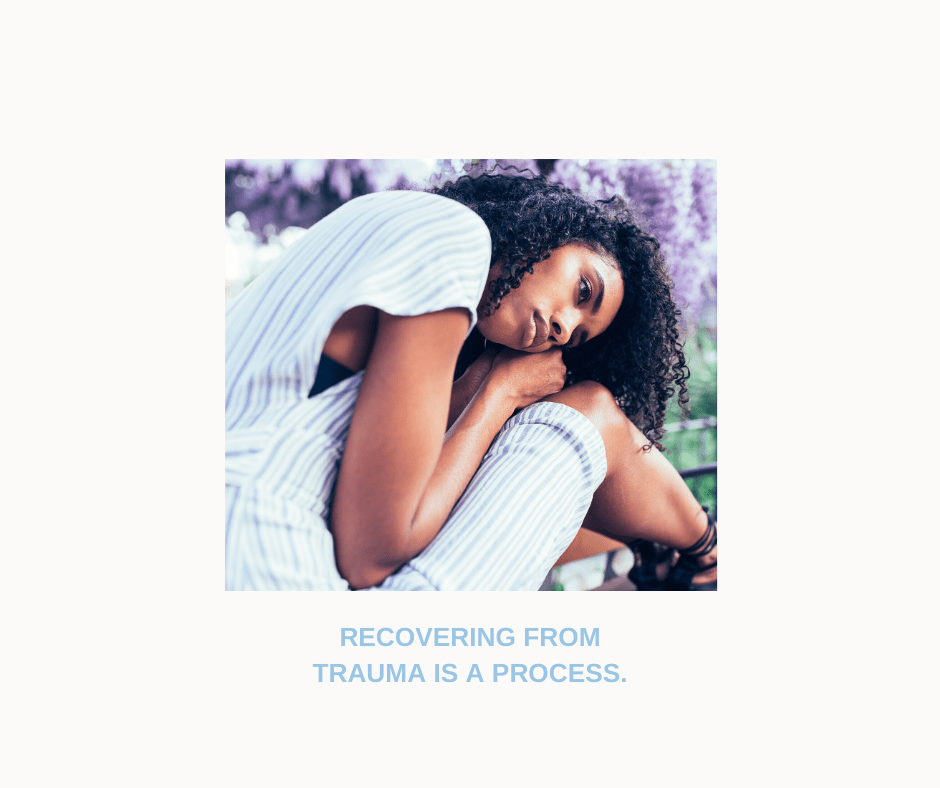
1. Trauma is an understandable reaction to an abnormal experience like HG: hyperemesis gravidarum is not the morning sickness of a healthy pregnancy. It means months of misery, painful invasive procedures, feelings of helplessness and hopelessness, fears of death or harm to one’s baby, complications during delivery, and worries the severe nausea and vomiting will never end. Even if you cannot identify one specific event during pregnancy that was really traumatic, the cumulative effect of prolonged, severe illness that overwhelmed you with fear and stress can be interpreted as trauma by the body.
It can be helpful to ask yourself: “What happened to me?” instead of asking “What is wrong with me?” When you think back, you may realize, “Of course I feel this way. Look what I just went through!” Your protective reaction is your body’s way of keeping you safe; your body is doing its job. However, you have to help your brain realize you are no longer threatened by the traumatic event(s) and it’s safe now.

2. Trauma is in the eye of the beholder. It is so important to validate your symptoms and experiences as true and authentic to you. Avoid comparison to others’ experiences that you feel might be more significant than yours.
3. Trauma changes the brain and is a very real and diagnosable medical condition. Trauma is not a character flaw, a weakness, or an inability to cope. Trauma can be viewed as anything that is “too much, too fast” and your body’s way of responding to this overwhelming experience.
4. You may not know you have experienced trauma. In order to survive these traumatic experiences, it is easy to minimize, ignore, or move on with your life without acknowledging that you have experienced something very scary. As a result, you may not be aware or ready to process your trauma for years after the traumatic event(s).
5 . It is normal to avoid, numb, or deny our trauma. It will not go away on its own and might require treatment. It may even take you months or years to fully accept that you have been traumatized. Denial and suppressing feelings or thoughts is often how you survive. Individuals may resort to drugs, alcohol, or distraction to avoid these feelings or memories.

6. Trauma can look a lot like Perinatal Mood and Anxiety Disorders (PMADs), but the treatment is very different. PMADs are more common than PTSD; in fact, PMADs are the number one complication of childbirth. Trauma can look a lot like anxiety and depression related to the postpartum period. The key difference between PMADs and trauma (and PTSD) is that the anxiety, depression, hypervigilance, and nightmares from PTSD are a result of an identifiable traumatic event(s), not a result of the hormonal and biological changes that happen after having a baby.

7. Trauma is treatable. You cannot talk your way out of trauma. These are experiences that are stored in your body. Traditional talk therapy has many benefits; however, the more research learns about the treatment of trauma, the more clear it becomes that EMDR (Eye Movement Desensitization and Reprocessing and brainspotting) along with other somatic based-therapies allow for higher success rate in allowing the brain to process the traumatic event(s).
8. Relationships are the agents for change. Studies show having one supportive, nonjudgmental person you can share your story with is crucial for healing.
9. Recovering from trauma is a process. Some days you might feel like yourself; other days you might feel that you have taken three steps backward. That does not mean you have not made progress or you are going back to where you started. Good days and hard days are all part of the healing process.

10. You are not alone. Up to 18% of women who have experienced HG meet full criteria PTSD and many more experience symptoms. In addition, 6 out of 10 men and 5 out of 10 women have experienced at least one traumatic event in their lifetime. Each traumatic event may increase our susceptibility to trauma in the future. With multiple traumatic events, professional treatment is likely needed for recovery.
Reach out, educate yourself, and give yourself rest and understanding as you navigate through the healing process.
Thank you, Jessica R. Stefanski, LMSW, for your contribution to this blog.
GET INVOLVED

